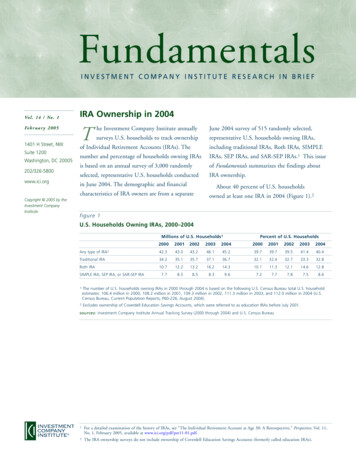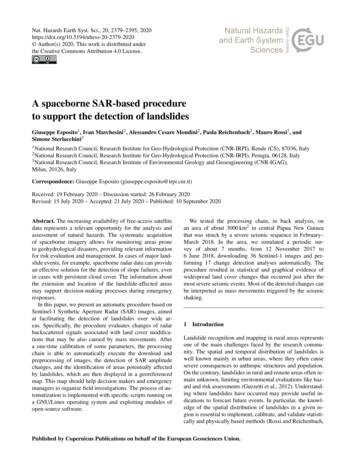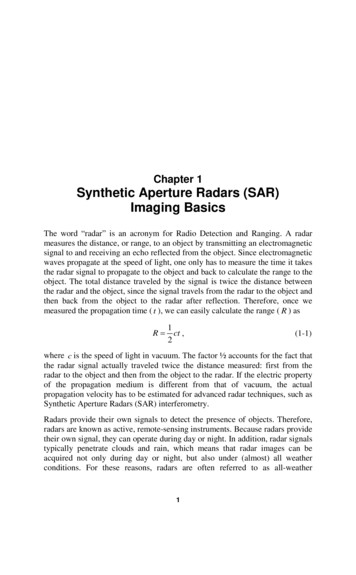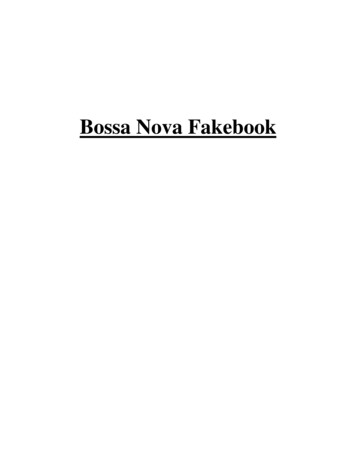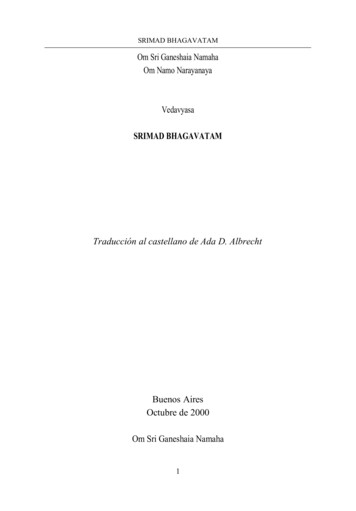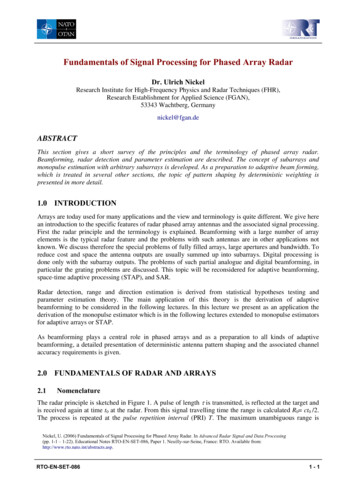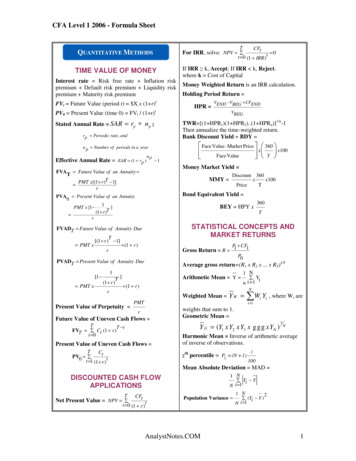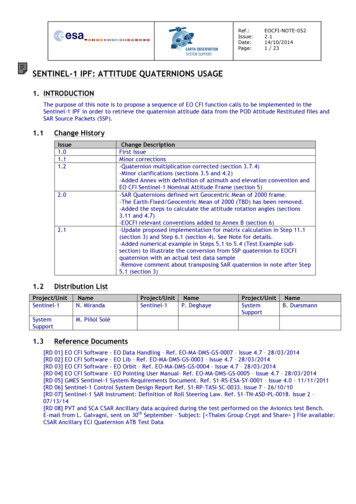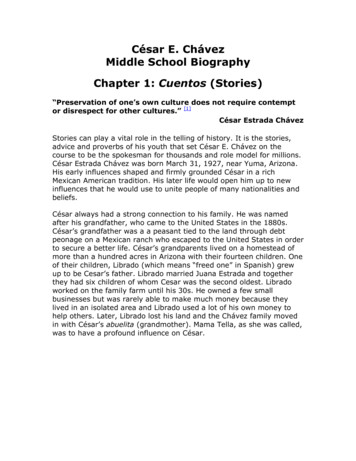
Transcription
César E. ChávezMiddle School BiographyChapter 1: Cuentos (Stories)“Preservation of one’s own culture does not require contemptor disrespect for other cultures.” [1]César Estrada ChávezStories can play a vital role in the telling of history. It is the stories,advice and proverbs of his youth that set César E. Chávez on thecourse to be the spokesman for thousands and role model for millions.César Estrada Chávez was born March 31, 1927, near Yuma, Arizona.His early influences shaped and firmly grounded César in a richMexican American tradition. His later life would open him up to newinfluences that he would use to unite people of many nationalities andbeliefs.César always had a strong connection to his family. He was namedafter his grandfather, who came to the United States in the 1880s.César’s grandfather was a a peasant tied to the land through debtpeonage on a Mexican ranch who escaped to the United States in orderto secure a better life. César’s grandparents lived on a homestead ofmore than a hundred acres in Arizona with their fourteen children. Oneof their children, Librado (which means “freed one” in Spanish) grewup to be Cesar’s father. Librado married Juana Estrada and togetherthey had six children of whom Cesar was the second oldest. Libradoworked on the family farm until his 30s. He owned a few smallbusinesses but was rarely able to make much money because theylived in an isolated area and Librado used a lot of his own money tohelp others. Later, Librado lost his land and the Chávez family movedin with César’s abuelita (grandmother). Mama Tella, as she was called,was to have a profound influence on César.
Photo Courtesy of César E. Chávez FoundationA baptism baby picture of César Estrada Chávez sitting in a chair.César’s mother and grandmother taught him a lot about sincerity andcharity through their actions. His mother, Juana, set an example of theimportance of helping others regardless of their background. Chávezremembered that she “had made a pledge never to turn away anyonewho came for food, and there were a lot of ordinary people who wouldcome and a lot of hobos, at any time of the day or night. Most of themwere white [nonMexican].”[2] Her kind example modeled for César thecharity that many only talk about. His grandmother, Mama Tella,modeled her kindness by sharing her wisdom. She made a point toteach the Chávez children the importance of being a moral person.She did this through stories, advice, and proverbs that always had amoral point. Later on in his life, César remembered his abuelita assomeone wise. He said, “I didn’t realize the wisdom in her words, butit has been proven to me so many times since.” [3] Throughout his life,César folded his grandmother’s teachings into his actions and mirroredhis mother’s kindness to others. He also reflected their values of‘practicing what you preach.’ César learned that he could not just tellothers how they were supposed to live their lives; he had to do itthrough his example.Mama Tella made sure that César had a strong religious upbringing. Allof the children learned what it meant to be a strong Roman Catholic.She taught them to appreciate the ceremonies and teachings of theCatholic Church. Cesar became a man who relied on his faith to give
him strength and direction. He understood that religion unified andstrengthened people. One example of a unifying symbol is the Virgin ofGuadalupe. For Mexican Catholics, the Virgin represents a uniquerelationship between the people of Mexico and the Roman CatholicChurch. Many Mexican Catholics (and other Latino Catholics) believethat the Virgin appeared to the people of the Americas as an NativeAmerican maiden in order to ease and bless their conversion toChristianity. Therefore, for many Mexican Americans, la Virgen deGuadalupe has always been a unifying force. César was always true tohis spiritual beliefs; they guided his everyday life as well as his politicalaction.Photo Courtesy of César E. Chávez FoundationCésar and his sister are dressed for their First Holy Communion.César heard stories about life in Mexico and about life in the UnitedStates after the Mexican Revolution. These stories made an impact onhow he would see the world in which he would grow up. César’s family
told stories about the unfairness of life in Mexico. They described howhacienda landowners would exploit their workers. He knew that thelandowners expected nonstop labor in exchange for the privilege ofearning a meager salary. He heard of the easy life that the rich had atthe expense of the poor workers. These stories of exploitation of thepoor by the rich set the stage for his strong belief in the importance offairness and justice. Very early, César started believing that the poorwere morally superior. He came to that conclusion because he felt thatit was the poor that did the majority of the hard physical work. It wasthe poor that took care of one another when they barely had enoughfor themselves. To César the poor were the ones who lived a morallife.The stories of injustice did not end at the border. His grandfather toldstories about the corruption of politics in El Paso, Texas. Librado wouldtell stories about his family’s efforts to gain political power in Arizonaby voting as a united block of people. César’s father became a leaderin the Mexican American community of Arizona. César saw firsthandthe power that could come from uniting people.Chapter 2: Cultura (Culture)“We need to help students and parents cherish and preservethe ethnic and cultural diversity that nourishes and strengthensthis community— and this nation.”César E. ChávezA problem familiar to Mexican Americans was prejudice at school.While in Yuma, Arizona, César discovered what life was like for astudent who had grown up speaking and reading Spanish at home. Hislessons in prejudice started his first day of school, at age seven, whenthe other kids started making fun of his accent and called him a “dirtyMexican.” His teachers punished him for speaking in Spanish. At thattime, corporal (physical) punishment was allowed in the schools andCésar discovered that he would get hit for speaking Spanish. He said,“When we spoke Spanish, the teacher swooped down on us. Iremember the ruler whistling through the air as its edge came downsharply across my knuckles.” [4] When there were fights on schoolgrounds between Mexican kids and Anglo kids, the teachers andprincipals always took the side of the Anglo kids. This type oftreatment again re-affirmed for César the importance of justice. It also
taught him the importance of letting people be themselves. He sawhow disheartening it was to be punished for just being oneself.In 1937, César and his family were evicted from their land in Arizonaand moved to California as migrant workers. They joined many othersgoing to California during this time of the Great Depression. Césarexperienced firsthand what it was like to wake up at 3:00 in themorning, ride a truck for an hour to get to the fields, work in the sunall day, and then return in the evening after another long ride, only tostart over again the following morning. He understood that this type ofhard, physical labor resulted in minimal wages and discrimination. Healso knew there was no security for the workers and their families. Ifsomething happened to the worker, then his family was just out ofluck. César grew up knowing the toll that such work took on a person’sbody and spirit.César also learned the stories of other cultures and people. When hisfamily began working in California, they worked alongside a multitudeof races. César saw that African Americans, Anglo Americans, andAsian Americans all had similar stories of struggle, conflict, anddisplacement. Throughout his life César made sure that his workhelped people of all races to succeed. He saw them as commonbrothers who could unite. Basically, César grew up understanding thata democracy’s strength comes from a variety of people workingtogether. He never forgot that important lesson. This is one reasonwhy César E. Chávez is not just a Mexican American hero, but a heroto all people. He believed in the strength of the people and he showedit through his actions.As a young boy César learned from his family’s stories, his personalexperiences, and the teachings of others. This background, whencombined with his experiences during his teenage years, lit a fire inhim that would never be extinguished.Chapter 3: Trabajadores (The Workers)“It is ironic that those who till the soil, cultivate and harvestthe fruits, vegetables, and other foods that fill your tables withabundance have nothing left for themselves.”César E. ChávezDuring his teenage years, César personally encountered the conditionsof the migrant worker. He saw the despair in the migrant camps, he
witnessed the exploitation of farm workers, he had to survive on themeager wages, and he experienced ugly racism. He dedicated the restof his life to combating such conditions and way of life of life.César’s family was always on the move. It is estimated that during thetime of the Great Depression and World War II some 250,000 peopleworked as migrant workers, in California alone. They followed theharvest trail barely earning enough money to live on. They had tospend a lot of that precious money to buy gas to get to the next placeof work. It was a hard, insecure life full of hard, physical work.The migrant camps in which they were forced to stay were deplorable.Many camps did not have indoor plumbing and had little electricity.The houses were wood cabins that were drafty and damp. Sometimesthe family had to do without cabins and, instead, lived in tents. Thecompanies exploited the workers by charging high rent for theirdwellings. The rent was taken directly from their pay. The migrantfamilies had no choice but to stay at these places and buy food andmaterial from company owned stores.Photo by Cris Sanchez, Courtesy of United Farm WorkersFarm worker housing.
The migrant workers also had to deal with dishonest labor contractors.A labor contractor is someone hired by a company (in this case thegrowers) to find workers and oversee them. Unfortunately, many laborcontractors were dishonest men, though the companies did not care aslong as production continued. Many labor contractors would receive aportion of the profit that they paid the workers. Labor contractorssometimes underpaid the workers and kept the money for themselves.At other times, the contractors would under-weigh the produce inorder to cheat the farm workers, or they would not pay the correcttaxes and pocket the money instead. Sometimes the workers even hadto pay the contractor money for the opportunity to work, since somany people were desperate for employment during this time.César learned these things first hand working as a child in the fields.He had to quit school after the eighth grade because his father hadbeen hurt in a car accident and could no longer work. He had to quitschool in order to help support his family.César once recalled the backbreaking work that working in the fieldsrequired:“It’s like being nailed to a cross. You have to walktwisted, as you’re stooped over, facing the row, andwalking perpendicular to it. You are always trying tofind the best position because you can’t walkcompletely sideways, it’s too difficult ” [5]As a result of this experience, one of César’s goals was to makeworking conditions for the migrant worker more tolerable.Chapter 4: Dignidad (Dignity)“Years of misguided teaching have resulted in the destructionof the best in our society, in our cultures and the environment.”“Real education should consist of drawing the goodness andthe best out of our own students. What better books can therebe than the book of humanity.”César E. ChávezDuring his teenage years in the 1940s, César encountered ugly racismthat made a strong impression on his conscience. César remembers
going to a diner where a “White Trade Only” sign was posted. When heordered a hamburger the waitress laughed at him and said: “We don’tsell to Mexicans.” César was once arrested for sitting in a section of amovie theater not designated for Mexicans. The schools that Césarattended were also segregated and full of prejudice. César remembersstudents being made to run laps around the track because they spokeSpanish or being forced to write ‘I will not speak Spanish’ 300 times onthe board. Once César even had to wear a sign that said, ‘I am aclown. I speak Spanish.’ These experiences taught César thatsegregation destroys people’s worth in the eyes of others. Later in hislife, he talked about how hurtful this racism was and the scar that itleft on his self-esteem, “I still feel the prejudice, whenever I gothrough a door. I expect to be rejected, even when I know there is noprejudice there.”[6] Throughout his life, César did everything he couldto include others, so that they did not feel like outsiders.Photo from the National Archives“We Cater to White Trade Only” in a store or restaurant window.César grew up in a time when Mexican American youth were trying todistance themselves from the mainstream. Many Mexican Americanteenagers adopted the pachuco or zoot suit. It usually consisted of along suit coat with trousers that were pegged (tapered) at the cuff,draped around the knees with deep pleats at the waist, and a lowhanging watch chain. This style of dress became their symbol ofindividuality. Unfortunately, many other Americans, especially those inthe armed forces, saw these pachucos as anti-American. During a briefperiod in Los Angeles, in 1943, a series of Zoot Suit Riots occurredwhen American servicemen went around beating up Zoot Suiters In hisbook Up From Mexico, Carey McWilliams (who was an eyewitness)describes a scene during the Zoot Suit Riots:
Marching through the streets of downtown LosAngeles, a mob of several thousand soldiers, sailors,and civilians, proceeded to beat up every zoot-suiterthey could find. Pushing its way into the importantmotion picture theaters, the mob ordered themanagement to turn on the house lights and thenranged up and down the aisles dragging Mexicans outof their seats. Streetcars were halted while Mexicans,and some Filipinos and Negroes, were jerked out oftheir seats, pushed into the streets and beaten withsadistic frenzy.[7]César, like many other Mexican American youth, wanted to escape thisworld. For many Mexican American men, the only way to escape life inthe barrio or the fields was to join the military. César joined the Navywhen he was seventeen. He served in the Navy for two years duringWorld War II, then rejoined his family in the fields. However, he wasno longer a teenage boy; César was fully ready to become a grown-upin terms of family and union activity.In 1948, César Estrada Chávez married Helen Fabela. César and Helenwere partners in marriage and work. Helen quietly supported César inhis efforts and provided stability for the family while César wasworking tirelessly for the cause of the migrant workers. Between 1949and 1958, Helen and César had eight children. Helen helped to supportthe family by working in the fields, since César was not paid very wellfor his work. Helen’s strength can be seen in her response to César ashe was preparing to start his own union. César was concerned that hisnew venture would be too hard on Helen. Her memory: “ it didn’tworry me. It didn’t frighten me I never had any doubts that hewould succeed.” [8] Helen knew that together they would be able toface whatever life threw at them.Chapter 5: La Causa (The Cause)“It is possible to become discouraged about the injustice wesee everywhere. But God did not promise us that the worldwould be humane and just. He gives us the gift of life andallows us to choose the way we will use our limited time onearth. It is an awesome opportunity.”César E. Chávez
The importance of a union was obvious to César as he was growing upand working the fields. Migrant workers tried to unite in order to getbetter pay and better working conditions through unions. Most migrantworkers wanted better pay for the amount of produce that they helpedharvest, fairer treatment on the part of labor contractors, andinsurance for accidents. They even had to petition in order to getouthouses and accessible drinking water in the fields.For the companies, these demands cost money—so they dideverything they could to avoid paying. Many companies felt that if theygave in to any of the demands by a group of workers, then they wouldhave to meet other demands, as well. Even small improvements wouldcost a lot of money since they involved thousands of workers and largeamounts of land. In addition, many companies felt that the workers’demands would never be satisfied, so why start on a road that costmoney and had no end. So, instead of helping the workers, themajority of companies employed tactics to beat the unions. Theyasked the courts to prevent the unions from boycotting or picketing.They hired “goons” from other parts of the valley to come in and beatup strikers. They brought in undocumented foreign workers to help toreplace picketing workers. They had the police come and arrest thestrikers for causing disturbances. Finally, they used the media to makethe strikers seem violent and un-American. Since there was anticommunist feeling throughout the country, the companies tried tomake the union leaders appear to be anti-American socialists andcommunists. This is known as “red-baiting” since many communistcountries adopted a red flag, the color red will many times representsocialism or communism. People who use red-baiting hoped that the“red” label would cause people to reject the strikers. The red-baiting ofCésar would continue throughout the 60s and 70s. FBI files were kepton César and other leaders of the UFW during these years.César had a number of people as role models for his union activity.The first was his father, Librado, who joined many unions while Césarwas growing up. Another was Ernesto Galarza, who organized many ofthe strikes during the 1940s in which the Chávez’ family participated.Galarza later served as an advisor to César as he began to form hisown union’s leadership. However, his first taste of what it meant to bean organizer was given to him by a Catholic priest. Father DonaldMcDonnell decided that the physical needs of the migrant workersneeded as much nourishment as their spiritual needs. He set about toteach some of the migrant workers about organizing themselves toimprove their conditions. He taught them that organizing and betteringthemselves went along with the teachings of the Catholic Church. In
César, Father McDonnell found a friend and assistant. FatherMcDonnell saw a lot of potential in César and encouraged him to read.One of the readings that César took on was the Life of Gandhi by LouisFisher. This book made a deep impression on Chávez and he took theteachings of Gandhi quite seriously, as he would later demonstrate.Chapter 6: Entrenando(The Power of Organizing)“When you have people together who believe insomething very strongly—whether it’s religion orpolitics or unions —things happen.”César E. ChávezThrough his association with Father McDonnell, César met anotherman who would strongly influence his life: Fred Ross. While themigrant workers plight was not well known outside of California andTexas, the plight of the inner city Latino was at least given someattention. Fred Ross represented the Community Service Organizationwhose mission was to help train community leaders to change theirown communities. Ross was sent to set up chapters of the CSOthroughout California. In his travels Fred asked Father McDonnell if hecould recommend some local Mexican Americans to train. César wason the list Father McDonnell provided. After a two hour meeting FredRoss wrote in his diary, “I think I’ve found the guy I’m looking for.”César ended up volunteering, then working, for the CSO from 19521962.César quickly learned how to become an organizer through hisinvolvement with the CSO. He started out as a volunteer helping withvoter registration. He was soon promoted to chairman of the CSOvoter registration drives. César and his friends signed up so many newvoters that they were soon challenged. He was accused of being acommunist and was red-baited in the local papers. When César wouldnot back down, he started gaining sympathy and support fromneighboring citizens. César quickly recognized the importance ofstanding his ground even when outnumbered and out-spent. Helearned that with time people would recognize the a just cause andsupport it. César continued to volunteer for the CSO and learned manyother valuable lessons, one of which was the importance of helpingothers in order to establish a bond with them. He later said: “Once youhelped people, most became very loyal. The people who helped us when we wanted volunteers were the people we had helped.” [9]
Eventually, Fred Ross was able to hire César as a full-time worker forthe CSO, at 35 a week. It is interesting to note that for all his fameand hard work, César Chávez, throughout his life, never made morethan 6,000 a year.César became a force within the CSO—his personal experiences andlabor training having prepared him to be an effective organizer. In1958, he got involved in a farm worker’s dispute in Oxnard. César firstordered a sit-down strike in the fields to challenge negative hiringpractices by the growers. He also organized the first of many boycottsagainst the merchants who are selling the product. Chávez also madesure the workers kept meticulous records so that he could use therecords to prove what had really happened (instead of relying onhearsay). In addition, the workers picketed meetings, filed formalcomplaints with the government, and marched with a banner of theVirgin de Guadalupe. It was in Oxnard that César saw it all cometogether. The use of boycotts, marches, religious images, and politicallobbying became associated with César in later years, but it began atOxnard. The Oxnard experience also taught him that the workersneeded to establish formal contracts with the growers in order to keeptheir hard fought gains. He knew that without a formal union contract,the growers would be free to go back to their usual practices. He feltthat the CSO needed to form a union. However, the CSO leadershipdisagreed with César’s attempts to start one.César continued working for the CSO and, in this capacity, came to seethe problems that urban minorities were suffering. Life in the cities forminorities had its own set of challenges and César never forgot that allpeople needed to be helped. He worked for the CSO for three moreyears and came to gain many valuable political friendships through hiswork. One of these early associates was Dolores Huerta, who wouldone of César’s strongest supporters. Still, his heart was with themigrant worker. The CSO felt that its mission was in the cities; Césarfelt that his was in the fields. In one of many acts of conscience, Césardecided to do what he felt was the best thing for the migrant workers.He resigned from the CSO and decided to organize farmworkers.Chapter 7: Sí, Se Puede (Yes, it can bedone)“We are tired of words, of betrayals, of indifference they are gone when the farm worker said nothing anddid nothing to help himself Now we have new faith.
Through our strong will, our movement is changingthese conditions We shall be heard.”César E. ChávezFrom the (United Farm Workers’) (UFW’s) very beginning, César’s basewas Delano, California. It was in Delano that César set up his firstheadquarters. He chose Delano because there was a year roundfarming community and because César’s brother Richard lived thereand could help out. From Delano, California, the Farm WorkersAssociation was born in 1962. He set about to organize a strong union,knowing that it would be a while before he would have enough of amembership to be effective. He traveled from camp to camp passingout questionnaires and meeting with the workers so that he wouldknow what their needs were.Photo by Manuel EchavariaFarm workers gather at the Santa Maria United Farm Workers Union Hall in the early 1970s.
The first order of business was directly helping the workers. With thehelp of his brother Richard and the union’s membership, César openedup a small credit union to help the workers weather financial problems.He opened up his home to to farm workers and many would travel toDelano to tell César of the hardships they encountered. Like hismother’s house, the Chávez home was open to all who needed it.Slowly, César started recruiting other leaders to help him. TheReverend Jim Drake, of the California Migrant Ministry (CMM) startedworking with César and he was able to bring an establishedecumenical (many faiths) movement with him. The CMM was made upof Protestant leaders committed to helping the farm workers in thefields. The relationship of these ministers to the workers was verymoving to César. He pleaded with the leadership of the CatholicChurch to send more priests to the fields to minister to the needs ofthe workers. Though César was a Catholic, he always believed that themovement should include all others, regardless of race, creed orreligion. For the remainder of his life César had strong ecumenicalsupport. César also recruited his cousin Manuel to help (throughout hislife César relied on his family to serve as his advisors). César was alsoable to convince Dolores Huerta to join him once again.It was now time to formally establish the association. On September30, 1962 the new association, the National Farm Workers Associationwas established (it later became known as the United Farm Workers).Chávez was elected President, Dolores Huerta and Gilbert Padilla vicepresidents, and Antonio Orendain, secretary-treasurer.It was at their first mass meeting that the powerful flag of the unionwas unveiled. The black eagle and red and white flag became arallying image for the union and Mexican Americans throughout theUnited States. That night, Manuel Chávez explained the symbolismbehind the flag: The black eagle signified the dark situation of the farmworker. The white circle signified hope and aspirations. The redbackground stood for the hard work and sacrifice that the unionmembers would have to give. They also adopted an official motto,“Viva la Causa” (Long Live Our Cause). Union opinions would bespread through its newspaper “El Malcriado” (the unruly one).[10]
Photo by Oscar Castillo, Courtesy of César E. Chávez FoundationCésar and farm workers man the picket line while striking a grower.Once the union was well established it begun a series of strikes thatwould give César national prominence. The workers came to trustCésar because he managed to help them help themselves. In a newsinterview with Wendy Goepel, César commented on his commitment toempowering workers. She paraphrased some of his words during theinterview as follows:“A Union must be built around the idea that peoplemust do things by themselves, in order to helpthemselves. Too many people, César feels, have theidea that the farm worker is capable only of beinghelped by others. People want to give things to him.So, in time, some workers come to expect help fromthe outside. They change their idea of themselves.They become unaccustomed to the idea that they cando anything by themselves for themselves. They haveaccepted the idea that they are ‘too small’ to doanything, too weak to make themselves heard,powerless to change their own destinies. The leader,of course, gives himself selflessly to the members, buthe must expect and demand that they give themselves
to the organization at the same time. He exists only tohelp make the people strong.”This empowerment was the goal of the UFW. The union had manysuccesses and failures toward this end in its early stages, but itsgreatest test would come with the Delano Grape Strike that started in1965.Chapter 8: La Huelga (The Strike)“We are going to pray a lot and picket a lot.”“There is no such thing as defeat in nonviolence.”“I am convinced that the truest act of courage, thestrongest act of manliness is to sacrifice ourselves forothers in a totally nonviolent struggle for justice.”César E. ChávezThe Delano Grape Strike grew from a small strike to one of nationalimportance. It began with a Filipino organization known as theAgricultural Workers Organizing Committee (AWOC) who asked theNFWA to support their strike. Chávez agreed and spent the next dayscampaigning among the workers to support the strike. César saw anopening to accomplish something major with this strike. A largemeeting was scheduled for September 16 (Mexico’s IndependenceDay). Though there were mostly Mexicans and Mexican Americans inattendance, the hall also contained African Americans, Puerto Ricans,Filipinos, Arabs and Anglo Americans. [11] After a spirited speech byCésar, all those attending voted to join the strike. The Huelga (strike)had begun and it involved an area of more that 400 square miles.Soon, the strike took on the look and feel of most other major farmstrikes. The ranchers brought in strikebreakers and harassed thepicketers. They also tried to intimidate the picketers with shotguns anddogs. They sprayed chemicals on the picketers and had the policeharass them. However, the majority of farm workers remainedcommitted to the strike.On the union’s side of the strike, César preached a call fornonviolence. César recognized the spiritual and political power ofnonviolence from his studying of Gandhi’s struggle in India and that ofthe Reverend Martin Luther King Jr. in the United States. César sawthe sympathy that nonviolent measures gave to the African Americancommunity as it struggled with authorities in the South. Many sawCésar’s movement as an extension of the nonviolent civil rights
movement of the previous decade. It was César’s call for nonviolencethat convinced so many to support
up to be Cesar’s father. Librado married Juana Estrada and together they had six children of whom Cesar was the second oldest. Librado worked on the family farm until his 30s. He owned a few small businesses but was rarely able to make much money because they lived in an isolated are

